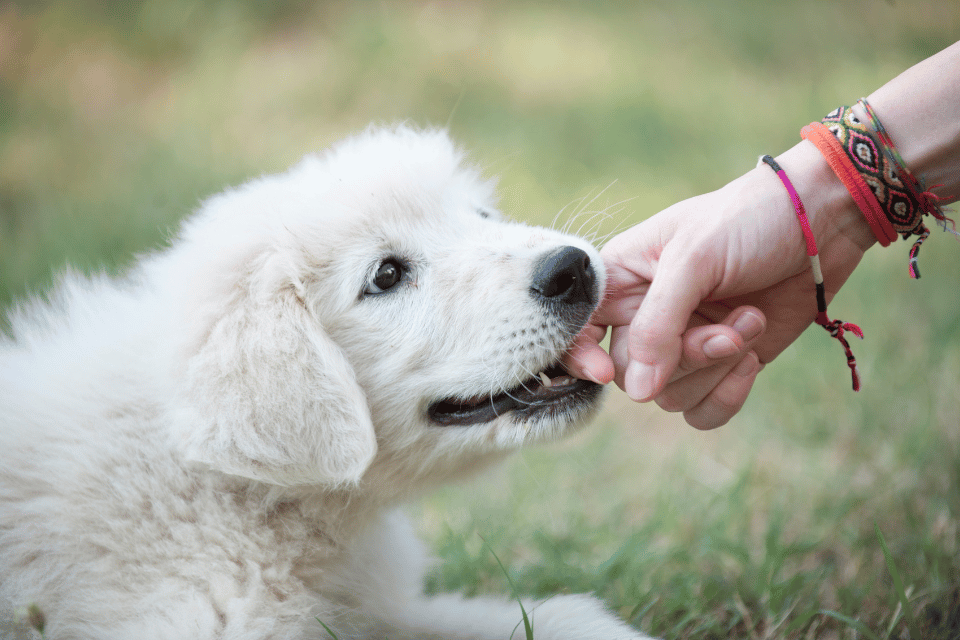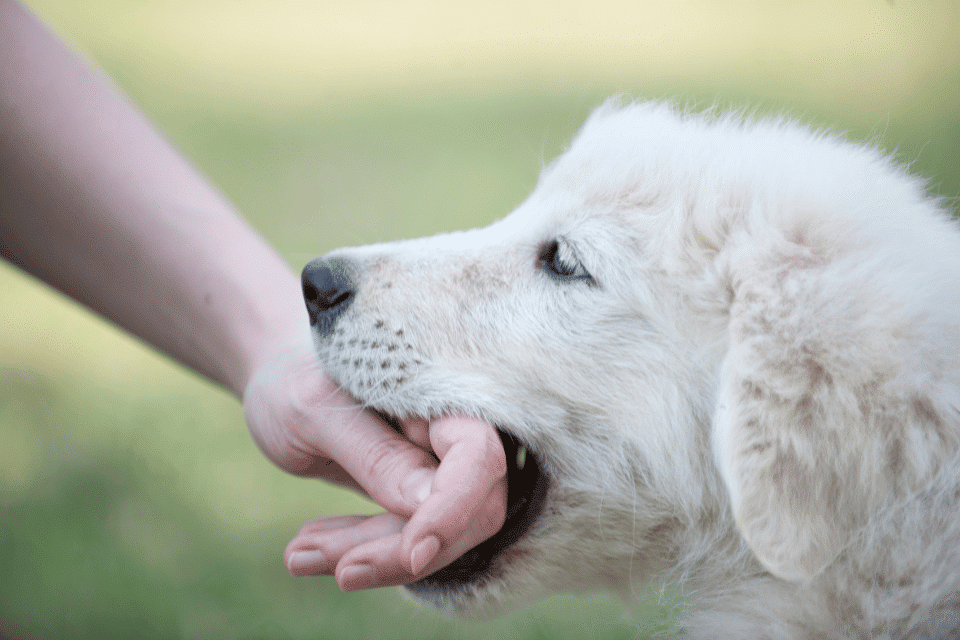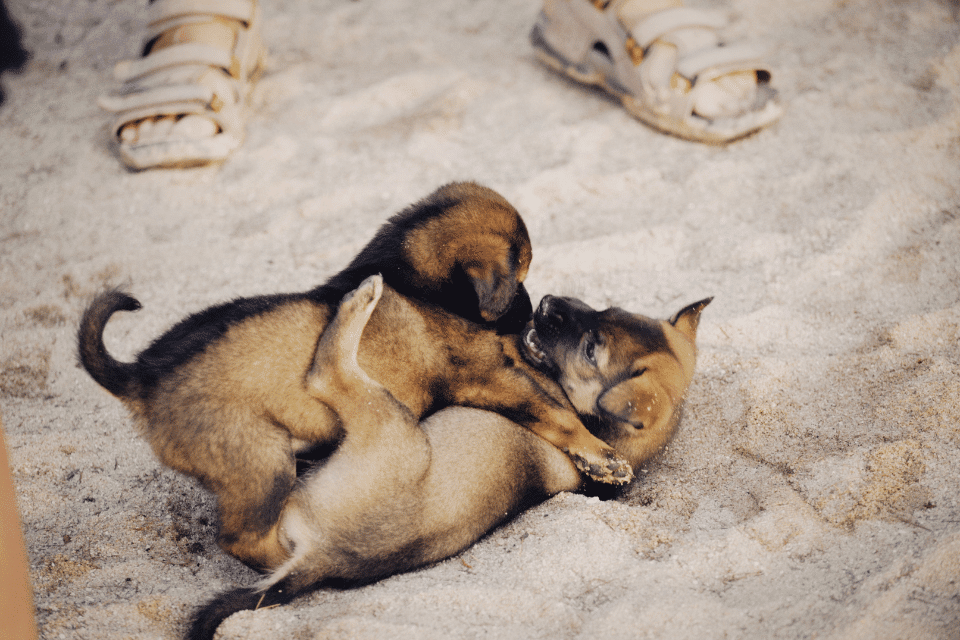
Puppies, much like human infants, explore their world through their mouths. This natural behavior, known as mouthing, is how they learn about their environment. However, when mouthing turns into biting, it can become a problem. This guide aims to offer a detailed understanding and strategies to effectively manage puppy-mouthing and biting behaviors.
Introduction to Puppy Behavioral Patterns
Understanding Puppy Biting
To effectively manage and stop puppy biting, it’s essential to understand the reasons behind this behavior.
Playful Biting
Puppies are naturally playful and curious. During playtime, they often use their mouths to interact with their surroundings, including people. This form of biting is usually gentle and non-aggressive. It’s a part of their learning process to understand the strength of their bite and how to interact with others.
Teething
Like human babies, puppies go through a teething phase, typically between the ages of three to six months. This period can be uncomfortable for them, leading to increased chewing and biting behaviors. They bite to alleviate the discomfort in their gums as new teeth emerge.

Overexcitement or Fear
Puppies may also bite when they are overly excited, anxious, or scared. It’s crucial to recognize the signs of these emotions. For instance, a puppy might bite more during a particularly rowdy play session or when they are in an unfamiliar environment that causes them stress.
Effective Techniques to Stop Puppy Biting
1. Redirect the Bite
When your puppy starts to bite, calmly redirect their attention to a chew toy or bone. This positive reinforcement technique helps them understand what is acceptable to bite. Keep a variety of chew toys accessible to keep their interest.
2. Use a Firm ‘No’
Consistency is key when training a puppy. When they bite, say ‘no’ firmly but calmly. It’s important not to shout, as this can scare them and lead to more aggressive behavior. Over time, your puppy will associate the word ‘no’ with the idea that they should stop what they’re doing.
3. Provide Plenty of Chew Toys
Invest in a range of chew toys with different textures and hardness. This not only keeps them entertained but also satisfies their natural chewing instincts, especially during the teething phase. Rotate the toys regularly to maintain their interest.
4. Implement Time-outs
If your puppy gets overly excited and starts biting, a time-out can be an effective tool. This doesn’t mean isolating them in a scary or uncomfortable place. Instead, calmly remove them from the play area or stop interacting with them for a few minutes. This teaches them that rough play leads to the end of fun interactions.
5. Encourage Gentle Play
Reward your puppy with treats, praise, or affection when they play without biting. This positive reinforcement encourages them to repeat the behavior. It’s also essential to avoid rough play or games like tug-of-war, which can encourage biting.
6. Socialization
Proper socialization is crucial for a well-behaved puppy. Introduce your puppy to different people, animals, environments, and situations. This exposure helps them learn appropriate behavior and bite inhibition from other dogs.
7. Puppy Training Classes
Professional puppy training classes can be invaluable. Trainers offer structured environments where puppies learn to interact appropriately with other dogs and people. They can also provide tailored advice for your puppy’s specific needs.

Additional Tips and Considerations
Consistency and Patience
Training a puppy requires consistency, patience, and understanding. Puppies learn through repetition, so it’s crucial to be consistent in your responses to their behavior.
Understanding Body Language
Learn to read your puppy’s body language. Signs of fear, anxiety, or overexcitement can preempt biting behavior, allowing you to intervene proactively.
See also our article on “Dog pressure Points to stop biting.”
Avoid Physical Punishment
Physical punishment is not an effective method to stop biting. It can lead to fear, anxiety, and even aggression in puppies.
Seek Professional Help if Needed
If you’re struggling to manage your puppy’s biting behavior, don’t hesitate to seek help from a professional dog trainer or behaviorist.
Conclusion
Stopping puppy biting is an essential part of your pet’s training and socialization. By understanding the reasons behind biting and employing effective techniques, you can teach your puppy appropriate behavior. Remember, each puppy is unique, and patience and consistency are key. With the right approach, you can enjoy a happy and well-behaved companion for years to come.
FAQs: Addressing Key Concerns
- What strategies are effective against puppy biting?
Combining behavioral techniques, routine establishment, and positive reinforcement proves effective. - Is fear-induced biting normal in puppies?
Yes, understanding and addressing the underlying fear is crucial for managing this behavior. - How does teething contribute to biting?
Teething can increase biting tendencies; providing chew toys suitable for teething can help alleviate this.
Legal Disclaimer: The information provided in this guide is intended for educational purposes only. While every effort has been made to ensure the accuracy and effectiveness of the information, it should not be considered as professional veterinary advice. Always consult with a professional veterinarian or a certified dog trainer for specific advice related to your puppy’s health and behavior. The author and publisher of this guide are not responsible for any adverse effects or consequences resulting from the use of the suggestions or information herein.





